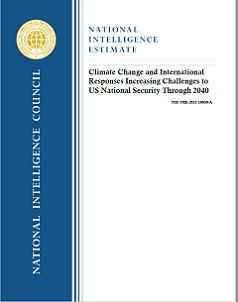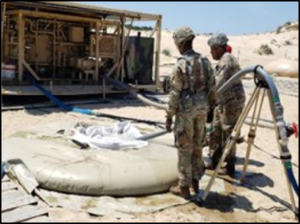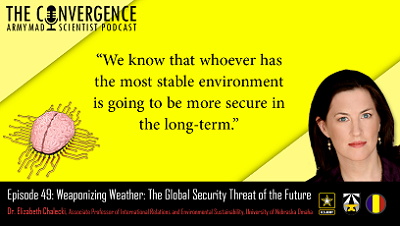“We assess that climate change will increasingly exacerbate risks to US national security interests as the physical impacts increase and geopolitical tensions mount about how to respond to the challenge. Global momentum is growing for more ambitious greenhouse gas emissions reductions, but current policies and pledges are insufficient to meet the Paris Agreement goals. Countries are arguing about who should act sooner and competing to control the growing clean energy transition. Intensifying physical effects will exacerbate geopolitical flashpoints, particularly after 2030, and key countries and regions will face increasing risks of instability and need for humanitarian assistance.” — Key Takeaway from the National Intelligence Council‘s National Intelligence Estimate Climate Change and International Responses Increasing Challenges to US National Security Through 2040
[Editor’s Note: Army Mad Scientist is pleased to present our latest episode of The Convergence podcast, featuring proclaimed Mad Scientist Dr. Elizabeth L. Chalecki discussing the broad global security implications of climate change and manipulation; their effects on Army and DoD readiness, operations, and mission requirements; and potential approaches for mitigating and regulating these threats — Enjoy!]
[If the podcast dashboard is not rendering correctly for you, please click here to listen to the podcast.]
 Elizabeth L. Chalecki is an Associate Professor of International Relations and Environmental Sustainability at the University of Nebraska Omaha, a Research Fellow in the Environmental Change and Security Program at the Woodrow Wilson Center, and a Research Chair with Fulbright Canada. Her expertise lies in the areas of climate change and security, international environmental policy, and the intersection of science/technology and International Relations. Dr. Chalecki has authored groundbreaking research on geoengineering and just war, and has published over 25 books, articles, and chapters on diverse topics such as climate change and Arctic security, environmental terrorism, climate change and international law, public perceptions of environmental issues, and water in outer space. She also serves as an environmental security subject matter expert for NATO. Dr. Chalecki holds a Ph.D. in International Relations from the Fletcher School of Law & Diplomacy at Tufts University, a M.Sc. in Environmental Geography from the University of Toronto, and an M.A. from Boston University.
Elizabeth L. Chalecki is an Associate Professor of International Relations and Environmental Sustainability at the University of Nebraska Omaha, a Research Fellow in the Environmental Change and Security Program at the Woodrow Wilson Center, and a Research Chair with Fulbright Canada. Her expertise lies in the areas of climate change and security, international environmental policy, and the intersection of science/technology and International Relations. Dr. Chalecki has authored groundbreaking research on geoengineering and just war, and has published over 25 books, articles, and chapters on diverse topics such as climate change and Arctic security, environmental terrorism, climate change and international law, public perceptions of environmental issues, and water in outer space. She also serves as an environmental security subject matter expert for NATO. Dr. Chalecki holds a Ph.D. in International Relations from the Fletcher School of Law & Diplomacy at Tufts University, a M.Sc. in Environmental Geography from the University of Toronto, and an M.A. from Boston University.
In our interview with Dr. Chalecki, we explore the broad global security implications of climate change and manipulation; their effects on Army and DoD readiness, operations, and mission requirements; and potential approaches for mitigating and regulating these threats. The following bullet points highlight key insights from our discussion:
-
-
-

The Office of the Director of National Intelligence released its first NIE on climate change last year, assessing the near- and medium-term geopolitical implications of climate change abroad. The consequences of climate change will force countries to reconsider their definitions of security. Instead of traditional military force size and strength, the stability of the environment will reflect the security of nations. Importantly, climate change is a security threat interconnected with the actions of other countries.
-
-
-
-
- Temperature increases and precipitation changes caused by climate change will have incalculable second order effects. Food security, civil unrest, migration, border insecurity, and disease patterns will all be shaped by the changing environment.
-
-
-
-

Soldiers operating the Tactical Water Purification System (TWPS) / Source: WATER PURIFICATION LANES EVALUATION in Quartermaster, Summer 2019 Climate change will alter Army operations. The Army’s focus may shift to humanitarian support and peacekeeping missions in regions destabilized by climate change. Additionally, the emergence of novel diseases in deployment regions could reduce the size of the Army’s recruitment pool due to increased social resistance to vaccinations.
-
-
-
-
- Humans are looking at geoengineering – specifically solar radiation management (i.e., shielding the Earth from the Sun’s rays) and carbon dioxide sequestration – to fight climate change. However, these solutions are impossible to test without consequence, necessitating their careful development and regulation via international law. Currently, there is no national policy nor international law in place regulating geoengineering. Failed attempts at geoengineering could harm the global ecosystem worse than the climate change it seeks to mitigate, with potentially destabilizing effects.
-
-
-
 As governments fail to address climate change, individuals and subnational groups may be motivated to act in radical ways. Governments should anticipate this increased risk of eco-terrorism in their efforts to maintain stability and prevent further degradation to the environment.
As governments fail to address climate change, individuals and subnational groups may be motivated to act in radical ways. Governments should anticipate this increased risk of eco-terrorism in their efforts to maintain stability and prevent further degradation to the environment.
-
-
-
- The global community should reconsider what it means to be both sovereign and a citizen. National borders split people with common ecosystems who would benefit from collaboration. Domestic actions by individual governments can have repercussions on shared ecosystems far beyond their territorial borders.
-
 Stay tuned to the Mad Scientist Laboratory for our next episode of The Convergence podcast — featuring CPT Maggie Smith and MAJ Joe Littell from the Army Cyber Institute, United States Military Academy, West Point, discussing the impact of information operations on recruitment, retention, and overall force readiness, as well as re-thinking our processes for gaining information advantage over our adversaries.
Stay tuned to the Mad Scientist Laboratory for our next episode of The Convergence podcast — featuring CPT Maggie Smith and MAJ Joe Littell from the Army Cyber Institute, United States Military Academy, West Point, discussing the impact of information operations on recruitment, retention, and overall force readiness, as well as re-thinking our processes for gaining information advantage over our adversaries.
If you enjoyed this post, check out Dr. Chalecki‘s presentation on Avoiding a Climate Arms Race, from last year’s Climate Change – Threats, Resilience, and Adaptation Webinar; as well as her works page, Should We Govern Geoengineering like Nuclear Weapons or the Internet? and Geoengineering Must Stay Peaceful;
Manipulating the Climate: What Are the Geopolitical Risks? by our colleagues at RAND Review;
… and Shén fēng: Military Use of Weather Modification Technology, by Rory Fedorochko;
… as well as the following Mad Scientist content on climate change:
Own the Heat: DoD Climate Change Action with Richard G. Kidd IV and associated podcast
The Inevitable Threat: Climate Change and the Operational Environment
“The Heat is On” in “The Queue” Redux!
Climate Change: Destroyer of World, by CPT Kyle Hallowell
On Thin Ice…, by proclaimed Mad Scientist Seth Gnesin
Water: A Fluid Challenge for the Future, by proclaimed Mad Scientist Caroline Duckworth
Climate Change as a Threat Multiplier, by LTCOL Nathan Pierpoint, Australian Army
Climate Change Laid Bare: Why We Need To Act Now, by proclaimed Mad Scientist Sage Miller
Future Threats: Climate Change and Islamic Terror, by Matthew Ader
Disclaimer: The views expressed in this blog post do not necessarily reflect those of the Department of Defense, Department of the Army, Army Futures Command (AFC), or Training and Doctrine Command (TRADOC).



